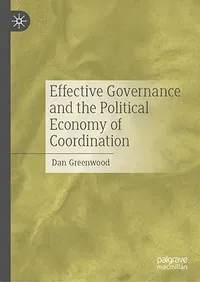Book review: Effective Governance – Dan Greenwood
How to plan for collective goals when the market knows best? Dan Greenwood's book, Effective Governance, shows the way.

Get the latest financial news, insights and expert analysis from our award-winning MoneyWeek team, to help you understand what really matters when it comes to your finances.
You are now subscribed
Your newsletter sign-up was successful
Want to add more newsletters?

Twice daily
MoneyWeek
Get the latest financial news, insights and expert analysis from our award-winning MoneyWeek team, to help you understand what really matters when it comes to your finances.

Four times a week
Look After My Bills
Sign up to our free money-saving newsletter, filled with the latest news and expert advice to help you find the best tips and deals for managing your bills. Start saving today!
It is a mystery that some problems are better solved by decentralised systems where everyone does their own thing and the best result that emerges from the unplanned interactions selected for in some way, than by a coordinated plan produced centrally. And yet it is a fact. If you want to design something as complex and well-adapted as a human being, a decentralised system of improvisation, competition and natural selection will work better than a central committee. The same applies if you want to build a jumbo jet.
This is not merely of academic interest – it was the defining political and economic question for much of the 20th century and remains a live issue today. What social and political arrangement is best for enabling human flourishing and ensuring our various needs and desires are met? One where this is the settled will of a state or another political organisation that then seeks consciously to achieve these goals? Or a decentralised system of private ownership and entrepreneurship, where businesses are free to do and produce what they like within the law, guided by prices set in a free market, and the winners selected by consumer choice?
This question was, in the 20th century, hotly disputed by intellectuals, fought over fiercely in wars hot and cold, and eventually settled by history. And yet the problem has not entirely gone away because, as all but the most extreme libertarians will admit, the free-market option, to work well, still needs centralised political authority – to protect property and enforce contracts, maintain law and order, and defend against foreign aggression, at a minimum. Also, probably, to provide for those unable to provide for themselves, to have some role in the management of resources that remain quite properly public property and not the plaything of individuals, and to deal with “externalities” (the negative consequences of industrial and commercial activity, such as pollution, that affect third parties without being reflected in market prices).
MoneyWeek
Subscribe to MoneyWeek today and get your first six magazine issues absolutely FREE

Sign up to Money Morning
Don't miss the latest investment and personal finances news, market analysis, plus money-saving tips with our free twice-daily newsletter
Don't miss the latest investment and personal finances news, market analysis, plus money-saving tips with our free twice-daily newsletter
At a University of Westminster research symposium on the implications of climate change for the future of the built environment, researchers gathered to consider such problems as the need to reduce energy use, innovate with new kinds of building design, adapt to warmer environments, and to consider how to involve designers, planners, developers and a range of other stakeholders in decisions that inevitably involve difficult, complex trade-offs and choices.
The question that came up straight away – as Dan Greenwood, an academic at the University of Westminster, related in a talk given at the launch of his new book, Effective Governance and the Political Economy of Coordination (2023, Palgrave Macmillan) – was, just how is any of that going to be achieved? Through top-down government interventions? Or through decentralised processes of innovation in the market and civil society? Either way, how would the actions of multiple actors, with competing goals and incentives, be coordinated to give rise to something like the desired outcome? In other words, whenever we consider contemporary problems of pressing concern, the “fundamental questions of political economy” naturally reassert themselves.
Greenwood’s book does not seek to provide definitive blueprints for answering these questions. Indeed, it rather shows why we should not expect any such blueprints to provide good answers to questions of policy effectiveness and governance – precisely because good answers will be determined by a complex range of factors specific to each situation, from the geographic to the cultural to the socio-economic. Greenwood has long had an interest in the work of Friedrich Hayek, and his work draws on Hayek’s insights about the difficulty faced by planners in acquiring the kind of knowledge they would need to plan effectively – because it is dispersed throughout society, and held, often tacitly, by individuals acting in context-specific ways. Given this, it’s not surprising that the best of intentions are often thwarted by unintended consequences or frustrated by the difficulties of coordinating many actors.
Greenwood reviews the arguments for this point of view without at the same time committing himself to an ideological free-market agenda, not least because others have their insights to offer too: economist Elinor Ostrom, for example, on how commonly owned resources can be well managed without resorting to centralised authority or falling foul of the “tragedy of the commons”. Or the literature that has developed since the 1990s on how networks of organisations from across the public, private and third sectors have navigated the fundamental questions of political economy – or failed to. An awareness of the insights from these traditions of thought along with a focus on creating the right incentives and an open-mindedness about the full range of institutional possibilities will yield the best outcome, says Greenwood.
In the final chapters of his book, Greenwood shows how such thinking applies in case studies focusing on contemporary problems in the NHS and in the building of low- and zero-carbon homes. Although academic in tone and primarily intended for researchers, Greenwood’s book gives profound insights into the kinds of problems faced by those concerned with the effectiveness of governance in complex modern societies, and into how the pressing issues that we all today worry about and will be affected by might be solved.
Consider it as a gift for the classical liberal (or Marxist) in your life.
This article was first published in MoneyWeek's magazine. Enjoy exclusive early access to news, opinion and analysis from our team of financial experts with a MoneyWeek subscription.
Get the latest financial news, insights and expert analysis from our award-winning MoneyWeek team, to help you understand what really matters when it comes to your finances.

Stuart graduated from the University of Leeds with an honours degree in biochemistry and molecular biology, and from Bath Spa University College with a postgraduate diploma in creative writing.
He started his career in journalism working on newspapers and magazines for the medical profession before joining MoneyWeek shortly after its first issue appeared in November 2000. He has worked for the magazine ever since, and is now the comment editor.
He has long had an interest in political economy and philosophy and writes occasional think pieces on this theme for the magazine, as well as a weekly round up of the best blogs in finance.
His work has appeared in The Lancet and The Idler and in numerous other small-press and online publications.
-
 Can US small caps survive the software selloff?
Can US small caps survive the software selloff?US stocks have made their worst start to a year since 1995 relative to a global benchmark. But experts think some sectors of the market are still worth buying.
-
 Review: Eliamos Villas Hotel & Spa – revel in the quiet madness of Kefalonia
Review: Eliamos Villas Hotel & Spa – revel in the quiet madness of KefaloniaTravel Eliamos Villas Hotel & Spa on the Greek island of Kefalonia is a restful sanctuary for the mind, body and soul
